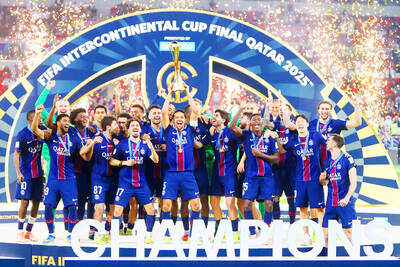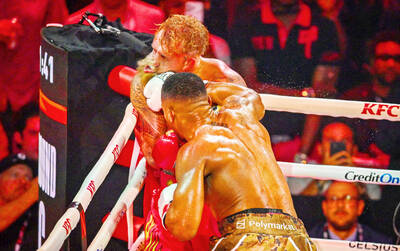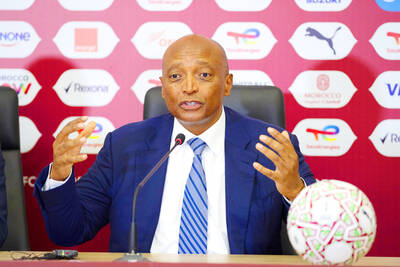One of the most arrogant pronouncements so far of the World Cup came from Steven Gerrard. Trying to explain how lowly Algeria managed to restrict England’s more competent soccer players to a goalless tie, the English captain said the North Africans played as though they were competing in the World Cup final.
In other words, the Algerians really put their hearts into it.
For England it was just another game.
Desire. It is proving a decisive factor at the World Cup and will be even more so in the knockout matches that began yesterday.
France and Italy blatantly lacked it in the group stages, were gobbled up by teams hungrier than them and were sent home in humiliation.
The US, Slovakia, Japan and others have it by the bucketload, and so fully deserve their spots in the round of 16, the point from which the World Cup really gets serious.
Of the 13 European sides that started this World Cup, only six advanced to the last 16, fewer than at the last three World Cups stretching back to 1998, when the tournament expanded to 32 teams.
However, the reason why European soccer powers like Germany, Spain, England, France and Italy struggled at times this World Cup or, worse, made fools of themselves, is not because their players are exhausted from long seasons with their clubs. If that were the cause, then Brazil and Argentina, both made up mainly of Europe-based players, would have looked jaded, too. They haven’t.
Altitude isn’t really an explanation, either. Nor is heat, because it’s been a cold month in South African.
Italian soccer federation president Giancarlo Abete trotted out another old scapegoat — foreign players — as the painful post-mortem of Italy’s failure got underway. That’s an argument England has used to explain past disappointments, too.
Where that argument falls down and is clearly untrue, however, is that it assumes that Italy has fewer decent players to choose from than, say, Japan, South Korea, Paraguay or Portugal, which all reached the last 16. Also, imports of top players make European leagues stronger, forcing European players to raise their game, too.
The English Premier League is now the toughest in the world precisely because of the more than 300 players from around the world who compete in it. That, in turn, makes the likes of Gerrard, John Terry or Frank Lampard better soccer players, not worse.
Which leaves mental attitude. The impression given at times by some “big” soccer nations at this World Cup is that they simply cared less than some “small” ones — teams like New Zealand, Paraguay, Switzerland or Serbia that played above themselves and pulled off surprise results in the group games.
Only in their last Group C match against Slovenia, with the disastrous prospect of an early flight out looming, did England’s players look like they genuinely cared. They did just enough to stay in South Africa ... for now.
Landon Donovan of the US, on the other hand, has been one of the standout players of the tournament so far because he is treating it with the respect it deserves. His ambition and that of his team has been impressive. In coming back from goal deficits against England and Slovenia and in Donovan’s injury-time goal against Algeria that got it to the last 16, the US team showed how badly it wants to succeed.
Like the US, Japan has also shown the enduring value of teamwork. Having beaten his marker, Keisuke Honda could have scored in the 87th minute against Denmark on Thursday. Instead, Honda passed to the even better placed Shinji Okazaki, who got the team’s third goal.
England proved in the group stages that a team can still squeak through even when its mind is not fully focused and when its players aren’t clicking.
However, that will not happen in the knockout stages. Being lackadaisical now will be fatal.

LOW-GOAL SHOOT-OUT: Of the nine penalties in the shoot-out, only three went in, with Flamengo’s Samuel Lino, and Vitinha and Nuno Mendes of PSG netting Matvei Safonov on Wednesday made four straight penalty saves in a penalty shoot-out to help Paris Saint-Germain beat Flamengo in the Intercontinental Cup final and win a sixth trophy of the year. The Russian goalkeeper was thrown in the air by his teammates after his exploits in the shoot-out, which was won 2-1 by PSG after a 1-1 draw after extra-time. It completed a trophy-laden 12 months for the French team, who had already won the Trophee des Champions, Ligue 1, the Coupe de France, the UEFA Champions League and the UEFA Super Cup — also on penalties against Tottenham Hotspur in

LACKLUSTER FIGHT: At one stage, the referee lost patience with the two fighters, warning them in the fourth round that ‘the fans did not pay to see this crap’ Former world heavyweight champion Anthony Joshua on Friday knocked out YouTuber-turned-boxer Jake Paul in their controversial Netflix-backed bout in Miami. The fight at the Kaseya Center, which saw both men reportedly splitting a mammoth purse of US$184 million, had triggered alarm across boxing due to the gulf in physical size and class between Britain’s two-time former world champion Joshua and Paul, an Internet personality who has forged a lucrative career through a handful of novelty boxing contests. However, in the event, Joshua made hard work of defeating his vastly less accomplished opponent, before his superior size and power eventually told

Paris Saint-Germain (PSG) were ordered on Tuesday by a French labor court to pay their former forward Kylian Mbappe up to 61 million euros (US$71.6 million) in unpaid wages and bonuses. France captain Mbappe, who left PSG in June last year to join Real Madrid, had been claiming more than 260 million euros in total from his former club. PSG in turn had demanded Mbappe pay them 440 million euros. Mbappe, 26, also claimed the Qatari-owned reigning European champions had applied the wrong French legal classification to his contract, but that was rejected by the court. The labor court said

The Africa Cup of Nations (AFCON) would in future be held every four years instead of every two years, the Confederation of African Football (CAF) said on Saturday. The surprise decision was made at the body’s executive committee meeting in Rabat and announced at a news conference by CAF president Patrice Motsepe. The tournament, which brings in an estimated 80 percent of CAF’s revenue, has traditionally been held every two years since its inception in 1957. Yesterday marked the start of the 35th edition, hosted in Morocco with the home team taking on Comoros. Motsepe said the next AFCON finals,